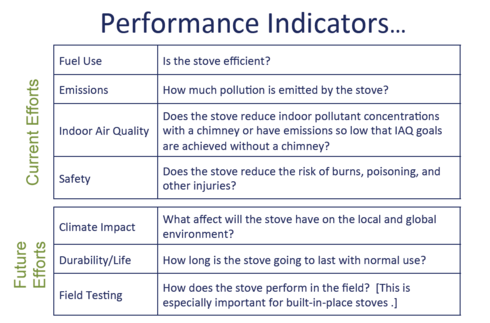Standards for Improved Cookstoves
For more information on the different tests, in their newest versions: Testing of Woodfuel Stoves
Introduction
Although many programs aim to improve access to cooking energy, due to logistical constraints monitoring is often restricted to measuring improvements in the quality of stoves. This serves as a proxy for better access to cooking energy, and thus effectiveness of the program.
Cookstoves vary greatly in technical performance across models and modifications. In order to measure the benefits of improved cookstoves, define what constitutes an improved cooking stove and to allow for comparisons between models it is thus necessary to conduct tests. For these tests to have significance in an international context and between organisations and labs, it is necessary to harmonise the approach and benchmark according to international regulations.
An overview of current international standards and recent development is given on this page.
The Road to an International Agreement
Although there have been several testing methods, minimum technical standards for improved stoves varied across countries and programs, with many countries lacking any sort of technical standards for improved cooking stoves. This, of course, did not help ensure that stoves disseminated with the label “improved” were actually effective. Two well-developed standards were those of Bolivia and Peru.
Standards BOLIVIA and PERU (Spanish)
In 2011, the Partnership for Clean Indoor Air (PCIA) organised a 5-day forum in Lima, Peru, for practicioners and experts on clean and efficient cooking technologies and fuels to exchange knowledge and foster co-operation. A part of this forum involved the signing of the Lima Consensus, a resolution to develop a standardised test protocol for measuring technical performance and a standard for improved cookstoves.
As a way forward, the community agreed to go through the process of developing an agreement in workshops, which would then be certified by the International Organisation for Standardisation (ISO). Based on this consensus, the International Workshop Agreement (IWA) was drafted by PCIA in cooperation with the Global Alliance for Clean Cookstoves (GACC) to be discussed and affirmed in The Hague, Netherlands in February 2012.
The International Workshop Agreement (IWA)
After review at the workshop, the revised IWA was unanimously approved on the second day. The agreement includes a framework allowing for the measurement of cookstove performance based on the Water Boiling Test (WBT 4.1.2) as well as resolutions including the development of protocols for more stove and test types, examining health effects and working on including cultural acceptance and behaviour in future work.
The categories in which performance is currently measured under the IWA are Fuel Use, Emissions, Indoor Air Quality, and Safety.
For these categories, a lot of work s gone into the development of tiers, so that stoves can be classified into different quality products. These range from tier 0 having no improvement over the baseline stove (usually the 3-stone fire) to tier 2 having substantial improvements and tier 4 stretching goals for targeting ambitious health and environmental outcomes.
For the WBT Tiers, see IWA Document, pages 10 and 11.
In the near future, these tiers will also be extended into other tests. Furthermore, in order to make sure that testing is done as close to the users as possible, regional testing centres are being promoted, making sure that the tests are adapted to the specific contexts of the region.
Further Information
Energypedia Site, including current test protocols: Testing of Woodfuel Stoves
Energypedia Site including test reports and the minimum standards for test reporting to EnDev and HERA. Stove Tests and Measuring
PCIA Website on Testing, giving an overview on past and current developments in cookstove standards, as well as a list of testing centres: http://www.pciaonline.org/testing
The Global Alliance for Clean Cookstoves (GACC) prioritises standards and testing, and regularly publishes updates: http://www.cleancookstoves.org/
References
- ↑ PCIA Presentation: ISO International Workshop Agreement Guidance for Clean Cookstoves. Available at http://bit.ly/1jMXMxZ




















